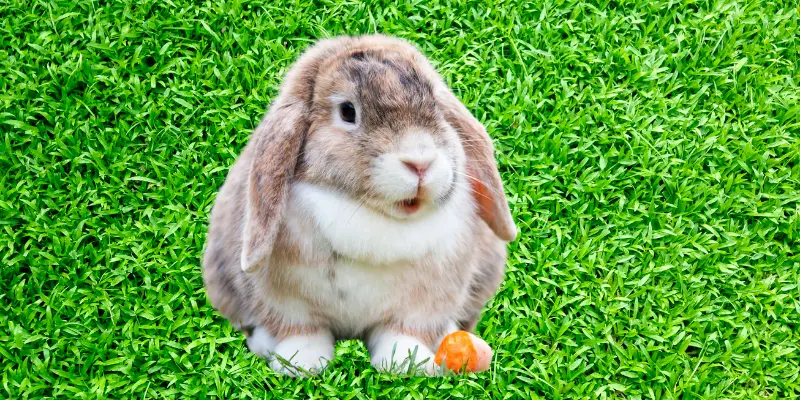Best Bunny Breeds For Pets – Find Your Perfect Bunny Today
Published: 01 May 2025
Best Bunny Breeds for Pets offer a variety of options for anyone looking for a loving, playful companion. Rabbits make adorable, quiet, and loving companions. They’re soft, friendly, and love to cuddle or hop around your home. But with so many breeds to choose from, how do you find the right one?
Table of Contents
Understanding Rabbit Breeds
Rabbits come in many shapes, sizes, and colours. Some are very small and easy to carry, while others are big and need more space to live. Each bunny breed has its own personality. Some bunnies are calm and quiet, and some love to play and explore.

It’s important to pick a rabbit that matches your home and how much time you can spend with it. Some are shy and small, while others are big and bold. Choosing a breed that fits your space and lifestyle is key to a happy bunny and a happy home.
Top 10 Bunny Breeds for Pets
1. Holland Lop
- Small and friendly
- Floppy ears and soft fur
- Great for kids and families
2. Mini Rex
- Very soft, velvety fur
- Calm and gentle
- Needs less grooming
3. Netherland Dwarf
- Very tiny and cute
- Active and curious
- Needs gentle handling
4. Lionhead Rabbit
- Has fluffy fur around its head like a lion
- Loves attention and playtime
- Good for older kids
5. Dutch Rabbit
- Known for its two colour pattern
- Calm and easy to train
- Good with children
6. Harlequin Rabbit
- Beautiful mix of colours
- Smart and playful
- Likes to stay active
7. American Fuzzy Lop
- Soft woolly fur with lopped ears
- Sweet and loving
- Needs regular brushing
8. Flemish Giant
- One of the biggest rabbit breeds
- Very gentle and calm
- Needs lots of space
9. Polish Rabbit
- Small and shiny coated
- Quiet and easy going
- Good for small homes
10. Jersey Woolly
- Fluffy and friendly
- Easy to handle
- Likes to be cuddled
Care Tips for Your Pet Bunny
Taking care of a bunny is fun, but it also needs love and attention. Here are some easy tips to help your bunny stay happy and healthy:
1. Give a Safe and Clean Home
- Use a big cage or playpen with soft flooring
- Keep the space clean and dry
- Add a hiding spot where the bunny can rest
2. Feed Fresh and Healthy Food
- Give fresh hay every day (it’s the main food)
- Add fresh veggies like carrots and lettuce
- Give clean water all the time
3. Brush Their Fur
- Some bunnies have short fur, others have long fur
- Brush your bunny once or twice a week
- Long-haired bunnies need more brushing
4. Let Them Exercise
- Bunnies need time outside their cage
- Let them hop around in a safe area
- Exercise keeps them strong and happy
5. Keep Them Social and Happy
- Talk to your bunny gently
- Pet them slowly so they feel safe
- Bunnies like love and playtime too
6. Visit the Vet
- Take your bunny for a check-up once a year
- Watch for signs of sickness like not eating or being too quiet
- Healthy bunnies live longer and feel better
Common Health Considerations
Bunnies are sweet pets, but they can get sick if we don’t take good care of them. Here are some common health problems that bunny owners should know:

1. Overgrown Teeth
- Bunny teeth keep growing
- If they don’t chew enough hay, their teeth can get too long
- Give lots of hay and chew toys to help
2. Stomach Problems (GI Stasis)
- Happens when their tummy slows down
- Bunny stops eating or pooping
- Give fresh hay daily and clean water to prevent it
3. Ear Mites and Infections
- Bunnies can get bugs in their ears
- You may see them shaking their head or scratching a lot
- A vet can treat this quickly
4. Flystrike (for outdoor bunnies)
- Flies lay eggs on dirty fur, which can be dangerous
- Always keep your bunny clean and check their bottom daily
5. Sore Hocks (hurting feet)
- Happens if your bunny is kept on a hard or wire floor
- Use soft bedding or mats in their cage
6. Snuffles (a bunny cold)
- Bunny may sneeze or have a wet nose
- This can spread to other rabbits
- A vet visit is needed for treatment
7. Hairballs
- Bunnies clean themselves and swallow fur
- Unlike cats, they can’t vomit hairballs
- Brushing helps stop too much fur from being swallowed
Advantages and Disadvantages of Best Bunny Breeds For Pets
Rabbits can make amazing pets, but like any animal, they come with their pros and cons. Here’s a look at both the advantages and disadvantages of having a pet bunny:
| Pros |
|---|
|
| Cons |
|---|
|
FAQs About Best Bunny Breeds For Pets
Got questions about pet bunnies? Check out our FAQs to find answers about bunny breeds, care tips, and everything you need to know to keep your bunny happy!
The Holland Lop is a great choice for first-time bunny owners. They are friendly, small, and easy to handle, making them perfect for families and beginners.
Bunnies need space to hop around. A large cage or playpen with room to move is important. They should also have time outside their cage every day to exercise.
Yes, it is safest to keep rabbits indoors. Outdoor rabbits can be exposed to predators, diseases, and extreme weather conditions. A quiet, clean, and safe indoor space is best for your bunny.
A healthy bunny is active, eats well, and has a clean coat. If your bunny isn’t eating, seems lethargic, or has any changes in behaviour, it’s important to visit a vet.
Rabbits can live with other pets like cats and dogs, but it depends on the animals’ temperament. Always supervise interactions, especially with dogs, as they may see rabbits as prey.
It’s important to clean your bunny’s cage at least once a week. Change bedding, remove any waste, and spot clean daily to keep their environment fresh.
Yes! Bunnies can be litter trained. They are naturally clean animals and often choose one spot in their cage to use as a bathroom. It’s a simple process to train them with a litter box.
Bunnies should eat fresh hay daily, along with some fresh vegetables like carrots and leafy greens. Avoid giving them too many sugary fruits or treats. Fresh water should always be available.
Bunnies can be great pets for children, but they must be handled gently. Young kids should be taught how to care for and interact with a bunny calmly. Older kids can take on more responsibility.
On average, rabbits live for 8 to 12 years with proper care. Some rabbits can live even longer if they are healthy and well-cared for.
Conclusion
Choosing the right bunny breed is all about matching your lifestyle and home environment. Whether you prefer a small and calm breed or a larger, more playful one, rabbits can make wonderful pets. With the right care, food, and attention, your pet bunny will be a loving companion for many years. Always consider their health needs and make sure to provide them with plenty of space and love.
Article by Pets Osrs

- Be Respectful
- Stay Relevant
- Stay Positive
- True Feedback
- Encourage Discussion
- Avoid Spamming
- No Fake News
- Don't Copy-Paste
- No Personal Attacks

- Be Respectful
- Stay Relevant
- Stay Positive
- True Feedback
- Encourage Discussion
- Avoid Spamming
- No Fake News
- Don't Copy-Paste
- No Personal Attacks





